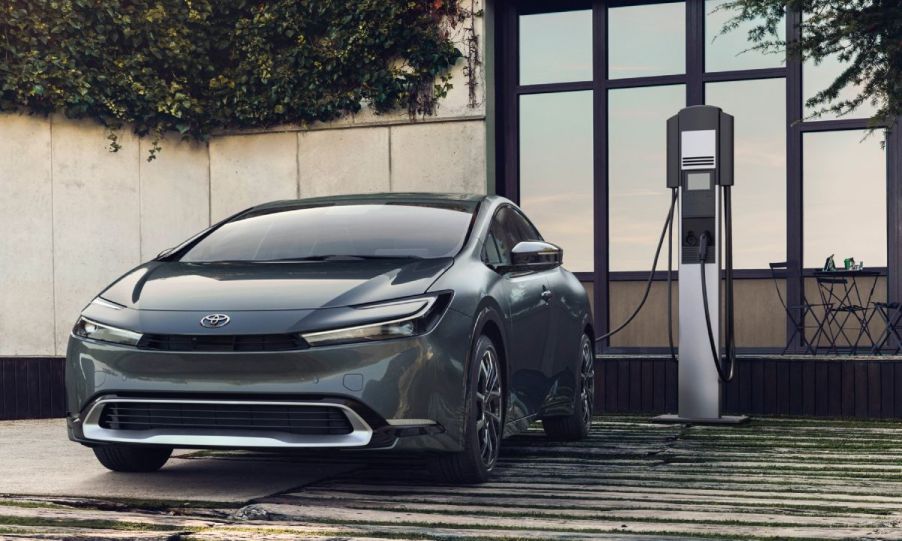
Toyota’s Hybrid Models Are More Reliable Than Its Plug-in Hybrids, According to Consumer Reports
Toyota has long been the standard for reliability among vehicle brands. The automaker is always one of the first listed, by both informal lists and formal studies, for reliability and dependability. Toyota was also one of the first automakers to start moving away from purely gasoline-powered vehicles.
Its Prius Hybrid was one of the first battery-powered vehicles on the road, though it was still dependent on gasoline. Toyota now has both traditional hybrid and plug-in hybrid electric vehicles. Consumer Reports recent survey noted some interesting things about both types of Toyota hybrids.

Consumer Reports pointed out that standard hybrid models tend to be more reliable
Even given Toyota’s high standard of reliability, there still have been some issues according to Consumer Reports. As hybrids have become more attainable to the more average consumer, more of them have been on the road for longer. That highlights some problems that may not have come up in the testing phases.
Consumer Reports says that EVs, including hybrid and plug-in hybrid electric vehicles (PHEV) have had problems, especially with in-car electronics. That includes infotainment systems and display screens. The issues appeared in their most recent survey, though they did see some interesting results with Toyota specifically.
The Toyota Prius Prime and the RAV4 Prime plug-in hybrids had lower reliability scores than the standard hybrid vehicles. Even the traditional RAV4’s gasoline version was graded as more reliable than either the RAV4 PHEV or the standard hybrid.
How do the Toyota PHEV and standard hybrid models differ?
According to Consumer Reports, PHEVs are a “bridge between traditional hybrids and full electric vehicles.” PHEVs rely on battery power for local, short trips, and gasoline power for extended range on longer trips.
PHEVs have a larger battery than standard hybrids. They have a longer electric range, but like regular hybrids, the gasoline engine and the electric motor will switch back and forth depending on use.
PHEVs will usually be more expensive, but they are eligible for the federal tax incentive. While the price may cause some people to balk, those who want an electric vehicle but need longer ranges may well find a PHEV is exactly what they need.
On the other hand, though, PHEVs tend to be less fuel-efficient than their standard hybrid counterpart, and the same challenges that some people find with either installing charging stations or finding them will not be alleviated. For people who live in apartments, for example, a standard hybrid could be better.
As for Toyota’s hybrid models, the PHEVs are more expensive. The RAV4 Prime, is $41,590 to the standard hybrid’s $30,225. The Prius Prime, though, is only $3,000 more than the standard Prius hybrid.
The Corolla Hatchback might end up being your best bet
Toyota’s only model with improved reliability wasn’t a hybrid of any type. The Corolla Hatchback ended up on Consumer Reports’ list of newly improved and recommended vehicles.
The Corolla Hatchback handles well on curvy roads, with what Consumer Reports calls “quick reflexes.” It gets a very respectable 36 mpg overall, and the front seats are comfortable, though the back is very cramped and small. They also said that the controls are easy to use and intuitive.
The Corolla Hatchback does have some drawbacks, though. It is loud, with a “raspy” engine. The ride is overall stiff, even though it handles well. If reliability is your number one concern, though, the Corolla Hatchback may be just right, especially since it starts at only $22,965.
Other models included on Consumer Reports list of most reliable and recommended cars were the Audi Q3, Buick Enclave, Mini Cooper, and Nissan Rogue. Hybrids on the list included the Ford Escape Hybrid, the Hyundai Santa Fe Hybrid, and the Kia Sorento Hybrid.
RELATED: 6 Toyota Models Dominate the Least Expensive Cars to Maintain


